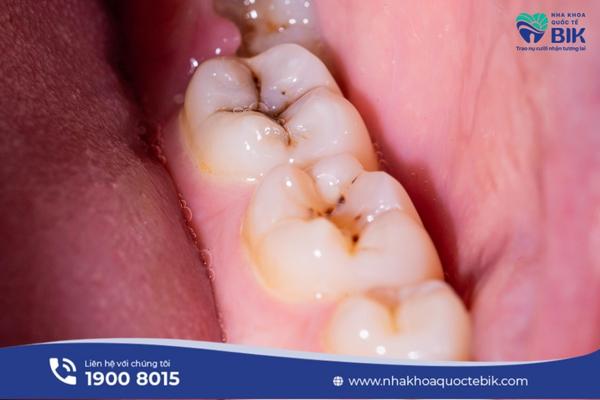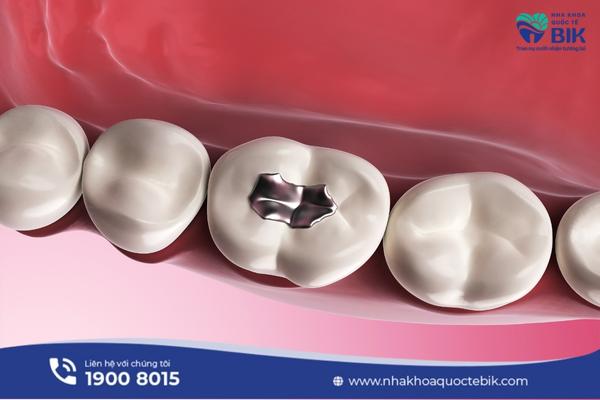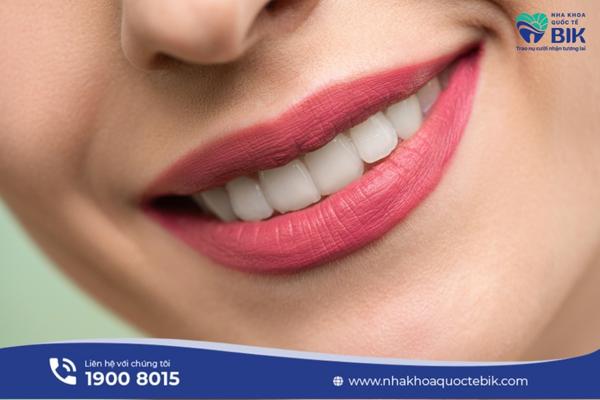
Sensitive lower jaw teeth are a condition in which the teeth become sensitive to hot and cold temperatures and other impacts from the external environment. The sensitivity can be reduced if you apply some simple tips at home. However, to treat it completely and safely, patients should still go to reputable dental facilities to find out the specific cause of the above condition, from which to implement appropriate solutions.
1. Causes of sensitive lower jaw teeth

Sensitive lower jaw teeth or sensitive lower jaw teeth can occur due to the following reasons:
1.1. Tooth enamel erosion
Tooth enamel is eroded by many different factors. Not cleaning your teeth after eating sweets will create an acidic environment that erodes tooth enamel. Because lemon and baking soda are highly acidic, using these ingredients to whiten teeth in the wrong dosage will also damage tooth enamel.
1.2. Improper oral hygiene
Brushing your teeth with a hard-bristled toothbrush and using too much force will not only make your teeth more sensitive but also affect your gums. In addition, you need to pay attention to the abrasiveness of the toothpaste to ensure that your tooth enamel is protected.
1.3. Tooth decay leads to lower jaw tooth sensitivity

Tooth decay is considered one of the main causes of most dental problems as well as other complications. Cavities in the teeth expose the nerves, making the teeth more sensitive than usual during eating and cleaning.
1.4. Sensitive lower jaw teeth due to gingivitis
When gingivitis occurs, the gums and soft tissues around the teeth will become red and swollen, causing bleeding at the gum line, damaging the ligaments, causing the root surface of the tooth to come into direct contact with hot and cold temperatures, causing sensitivity in the lower jaw teeth.
1.5. Trauma
Trauma causes the teeth to chip, crack and can damage the pulp. The impact can completely expose the pulp chamber, not only causing sensitivity but also increasing the risk of infection and pulpitis.
1.6. Improper dental treatment
If scaling or teeth whitening is performed incorrectly, it will not only cause sensitivity but can also cause many other complications that are much more dangerous.
2. Fixing lower jaw tooth sensitivity at the dentist

Sensitive lower jaw tooth can be fixed with the following measures at the dentist:
2.1. Tooth filling
Tooth filling is a technique to fill in chipped, cracked or slightly decayed areas with specialized materials. Thanks to the filling, the tooth can be restored to its original shape as well as protected from direct impacts from the outside environment. This method is completely painless and has a long lifespan if properly cared for.
2.2. Porcelain crowns
Porcelain crowns are a fairly common method today to restore and improve the aesthetics of teeth. Porcelain crowns cover the outside of the tooth and act as a protective layer for the entire tooth body and the inner pulp. Because it limits stimulation from the environment, this is a very effective way to overcome lower jaw tooth sensitivity.
3. How to treat lower jaw tooth sensitivity at home
In case you cannot go to the dentist immediately, you can apply some of the following tips to reduce toothache at home:
3.1. Use ginger

Ginger is warm in nature, so it helps reduce the feeling of pain or toothache very effectively.
How to do:
– Peel, wash fresh ginger and slice thinly
– Make ginger tea
– Drink small sips of freshly brewed tea or dilute it to rinse your mouth
– Do it regularly for many days to achieve maximum effectiveness
3.2. Use garlic

Garlic is a fairly basic ingredient that every family’s kitchen has. With strong antibacterial and anti-inflammatory active ingredients, garlic will soothe the feeling of toothache in the lower jaw, eliminate harmful bacteria to help the oral cavity become cleaner.
How to do:
– Use a mortar and pestle to crush the washed fresh garlic
– Use the crushed garlic and a little salt to apply to the area of the lower jaw toothache. In case of sensitive skin, use garlic juice mixed with water to rinse your mouth.
– Hold for a few minutes and then use clean water to clean your mouth
3.3. Use peppermint tea bags
You can use the peppermint tea bags after use to apply to the area of the toothache. In addition, peppermint essential oil also has outstanding antibacterial effects. Note, you should let the tea bag cool down but still keep it warm when applying to the tooth.
3.4. Using aloe vera

Because of its strong antibacterial properties, aloe vera is always known for its ability to reduce the discomfort caused by tooth sensitivity very well.
How to do it:
– Apply fresh aloe vera gel to the sensitive tooth area
– Rinse your mouth with clean water after a few minutes when the solution has penetrated the tooth
– Do not swallow aloe vera after holding it in your mouth
– Repeat several times until the discomfort subsides
4. Measures to prevent tooth sensitivity, lower jaw incisors
Some of the following methods can be applied to prevent tooth sensitivity:
4.1. Proper oral hygiene
You should brush your teeth twice a day, morning and night, with a soft-bristled toothbrush to avoid damaging your gums. In addition, you can combine mouthwash and dental floss to completely remove bacteria in the gaps between teeth, eliminating unpleasant odors caused by remaining food residue
4.2. Pay attention to your diet
Pay attention to limiting the use of drinks containing a lot of acid, especially carbonated water, orange juice, lemon juice, … or food that is too hot or too cold to avoid eroding tooth enamel, leading to lower jaw sensitivity.
You should add to your daily menu foods containing a lot of fiber such as bananas and apples so that the body has enough essential minerals to fight against the process of causing tooth sensitivity.
4.3. Calcium Supplement

Supplement natural calcium from foods such as butter, milk or green vegetables such as broccoli, almonds and dried beans to help strengthen teeth.
4.4. Regular dental check-ups
Experts recommend regular dental check-ups every 6 months to check your oral health. Thereby promptly detecting and treating the causes of lower jaw tooth sensitivity, if any.
So the condition of lower jaw tooth sensitivity occurs due to many causes, you can apply some tips to fix it at home or go to the dentist for advice and treatment with professional solutions.




















